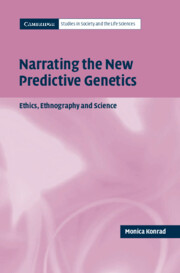6 - Relinquishing exclusion
Published online by Cambridge University Press: 15 December 2009
Summary
Let me begin with a little cautionary tale about exclusion testing. As a story within a story, there is a Russian Doll effect. But all is not what it seems. Orientation: we will be circling first of all around a sub-text whose plot prises open the problem of the ‘mock embryo transfer’.
Pre-implanting a story
Novel preconception testing technology such as pre-implantation genetic diagnosis (PGD) offers – the interested patient is told – a treatment procedure for those couples who want to have children without the potential risk of transmitting a pre-diagnosed hereditary condition to their offspring. Parents-to-be who may be considering such ‘treatment’ will be informed further by clinicians that the technique allows them to start a pregnancy with a pre-selected healthy embryo. Prospective PGD patients will be given statistics and risk figures that put the option of pre-implantation diagnosis into context, as against leaving things to nature and having a non-assisted conception. The medical assumption that a single cell diagnosis is ethically preferable to the elective termination of a pregnancy after prenatal diagnosis (or spontaneous termination) – something this group of patients is also likely to be told (or may know intuitively) – is an explanatory narrative that legitimises novel methods of human conception. It is therefore a moral narrative of a kind, framed as it is around certain ‘quality of life’ beliefs and sensibilities.
- Type
- Chapter
- Information
- Narrating the New Predictive GeneticsEthics, Ethnography and Science, pp. 124 - 145Publisher: Cambridge University PressPrint publication year: 2005



